My first impulse was to resist paying even a modicum of attention to the story following Richard Sherman’s postgame interview, namely because the goings-on of the sports industry — an industry that takes from Black bodies their bits and pieces of flesh, leaving Black athletes often permanently disabled and with little material or financial support in (a very early) ‘retirement’ — rarely surprise me or gives me pause for critical reflection. But then I saw the tweets. The disgusting, racist-cum-speciesist tweets.
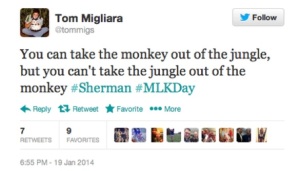 The number of tweets that compare Sherman to a monkey or an ape are …astounding, signaling a discursive and material investment in the hearts and minds of 21st century white (and ‘passing white’) Americans to intentionally confuse Black bodies with ape bodies. Here’s the rub: the structuring logic of anti-Blackness as speciesism — as I have started to suggest elsewhere, our white supremacist society imagines Black bodies as something different from (and paradigmatically Other to) human beings, as a constellation of flesh reduced to the order of things, made alive only in the figure of an animal in likeness to apes — produces a discursive violence not unrelated to the physical or corporeal (the ‘real’) violence experienced by Blacks.
The number of tweets that compare Sherman to a monkey or an ape are …astounding, signaling a discursive and material investment in the hearts and minds of 21st century white (and ‘passing white’) Americans to intentionally confuse Black bodies with ape bodies. Here’s the rub: the structuring logic of anti-Blackness as speciesism — as I have started to suggest elsewhere, our white supremacist society imagines Black bodies as something different from (and paradigmatically Other to) human beings, as a constellation of flesh reduced to the order of things, made alive only in the figure of an animal in likeness to apes — produces a discursive violence not unrelated to the physical or corporeal (the ‘real’) violence experienced by Blacks.
By way of example, some of the postgame tweets (righteously exposed for public shaming here and here) reference ‘lynching’ — and, more to the point, call for a public lynching of Sherman — a violence discursively legitimated through recourse to the idea that Black bodies aren’t human bodies; they are, instead, strange fruit (or animals) ripe for material and libidinal consumption. Other tweets suggest introducing Sherman to George Zimmerman, presumably because “Richard Sherman deserves to get shot in the fucking head.”
The breadth and variety of anti-Black Twitter responses to Sherman’s ‘outburst’ share one glaring similarity: they hold Sherman accountable for his affective response to Erin Andrews by suggesting only one way to placate the angry masses. Sherman is made analogous to an untamed animal who must be ‘put down’ — or, more to the point, taken out back and shot — because he cannot be contained. As poet and activist Olivia A. Cole notes on her blog, Sherman’s failure to perform a white respectability politics in his postgame interview with Andrews revokes his ‘Human Card’, reducing him to a monkey and a n****r (and — by Sherman’s own account — to a thug), which is to say, to a figure who can be shot and killed with impunity because the human right to life is — by definition of his Blackness — alien to him.
White supremacist culture dictates who and who does not get to be human. In order for people of color to receive a Human Card, they must assimilate: they must not use slang. They must be quiet. They must not wear hoodies. They must not curse. They must be gracious at all times. They must enunciate. They must not talk about racism. They must not listen to rap music. They must not sag. They must not brag. They must not laugh in public. They must not take up more than one seat on the bus. They must not ever ask for more. In short, you must be perfect. Robotic. Even if you are a professional athlete who performs for millions of Americans, playing a game in which aggression, testosterone, and energy are rewarded (demanded)… you must be quiet, gracious, calm, unassuming. Unscary. To be black and also be regarded as human, you must never make a mistake in your entire life, ever—ever—or you are a thug. Ghetto. Other. Your Human Card is denied.
I think that’s what the word “thug” really means. The n-word, arguably the most dehumanizing word in history, has been decried. It is considered inappropriate to speak it in public, and while that doesn’t stop everyone, hate will find a way. “Thug” is that way. Lately, it is a word used when we want to revoke humanity. Trayvon Martin, murdered only a few blocks from his home, was called a thug during his murderer’s trial. The jury needed to be convinced that this boy’s humanity could not possibly exist if he was “a thug.” Police [in Omaha] put a toddler’s “thuggery” on display as if to say, “This is why we police them.” …So when Richard Sherman’s “graciousness” is criticized, it’s more than his status as an athlete that’s being attacked: it’s his blackness. When the media (or the typical spineless, anonymous Twitter-user) calls him a “thug,” they are denying him his humanity.
Lest we forget, Sherman received a 3.9/4.0 GPA (reports on this figure vary) from Stanford University, where he plans to return for a Master’s degree. Likewise, he is a regular contributor to Sports Illustrated Magazine and otherwise speaks articulately and eloquently on screen (see the video below) with all the bougie cadence one might require of a Black man who has ‘arrived’. And Sherman isn’t just smart or well-spoken; he’s perceptive. As Arturo R. García writes in his thoughtful coverage in Racialicious, Sherman is keenly “[aware] of the coded language used against him” by white sports commentators; which is to say, Sherman is perfectly capable of performing (white) respectability, and he is plenty respectable. Consider the below interview from March 2013.
It is a testament to Sherman’s genius that he is able to preempt the psychic violence manifest in these racial codes, offering a response in real time to his white host: “I’m better than you”. We might go so far as to say that Sherman is melancholically aware, to borrow from Fanon — who reflects in Black Skin, White Masks (1952) that his subjective experiences of/in the world are “no longer a question of being aware of my body in the third person but in a triple person. …I was responsible at the same time for my body, for my race, for my ancestors. I subjected myself to an objective examination, I discovered my blackness, my ethnic characteristics; and I was battered down by tom-toms, cannibalism, intellectual deficiency, fetishism, racial defects, [and] slave-ships” (112, Farrington translation) — that he exists ‘triply’, anxious about how his Blackness is projected back onto him (for him). As Garcia notes, “One of the worst things about the worst responses to Richard Sherman’s interview Sunday night with Erin Andrews might be this: he probably saw it coming.”
Notably, Sherman does not use profanity in the postgame interview with Erin Andrews. What he does is display an affect of aggression, which — to be clear — is exactly what he is paid to do, and exactly what sports reporters get paid to procure from athletes in the ‘heat’ of the game (or postgame moment). As Nate Scott writes in an article in For the Win,
Some of these reporters [who complained about Sherman] were the very same ones who have complained publicly, in print, that athletes never do anything but speak in clichés. They long for the good old days, when athletes had real personalities and weren’t all trained by media specialists. You can’t have your cake and eat it too. You can’t complain that athletes are too well media-trained and the days of “big personalities” are gone and then freak out when an athlete goes off script.
Likew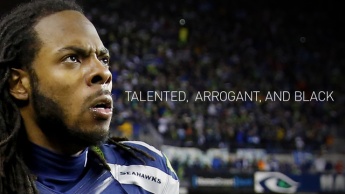 ise, NFL athletes are poked and prodded into aggression by coaches who aim to light a fire under the players that will burn bright and volatile on the field, motivating them to put ‘all they have’ into the game, a labor that (necessarily and completely) exhausts and depletes these athletes. But — as Stuart Hall famously observes in “The Spectacle of the ‘Other'” — we never think about any of that as (white) spectators to Black athletic ability, an ability that is assumed foundational, an effect of ontology, a product of the athlete’s Blackness, which renders him supra-human because he is other than human and can be reduced to the kind of abuse one usually reserves (to borrow from Frank Wilderson) for cows that, after grazing the field for scraps, are sent to the slaughterhouse.
ise, NFL athletes are poked and prodded into aggression by coaches who aim to light a fire under the players that will burn bright and volatile on the field, motivating them to put ‘all they have’ into the game, a labor that (necessarily and completely) exhausts and depletes these athletes. But — as Stuart Hall famously observes in “The Spectacle of the ‘Other'” — we never think about any of that as (white) spectators to Black athletic ability, an ability that is assumed foundational, an effect of ontology, a product of the athlete’s Blackness, which renders him supra-human because he is other than human and can be reduced to the kind of abuse one usually reserves (to borrow from Frank Wilderson) for cows that, after grazing the field for scraps, are sent to the slaughterhouse.
Of the thoughtful analysis that has emerged in the wake of this story, I have yet to come across one that critically engages Sherman’s own immediate reaction to the buzz that his postgame interview solicited. In a January 20th post for In This Corner, Sherman writes, “My body ached. I was thrilled and proud and upset, all at once.” I mention this reflection because a human body that aches is given respite; Black bodies reduced to chattel or monkeys or n****rs (or thugs) are not. Black athletes, especially, are discursively and materially imagined at their most intelligible as sinew and flesh — how else could they perform such supra-human feats of sport? — and not as coherent (human) bodies.
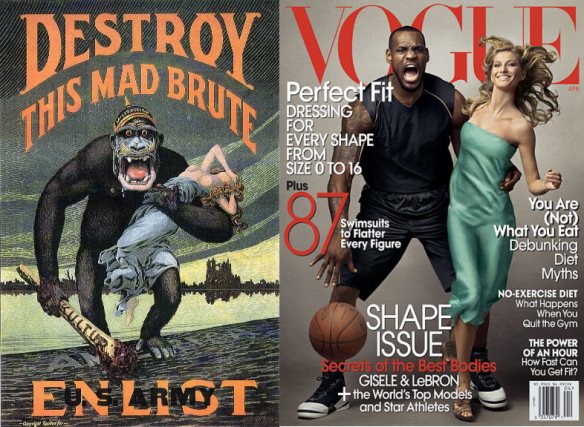 Instead of taking a breath (or a seat) after his win — a win immediately followed by a confrontation with Sherman’s ‘rival’, Michael Crabtree; in Sherman’s own words, “I ran over to Crabtree to shake his hand but he ignored me. I patted him, stuck out my hand and said, ‘Good game, good game.’ That’s when he shoved my face” — Sherman, the consummate NFL spokesperson, was assaulted by a series of reporters, of which Erin Andrews was just one. Let me repeat (for good measure and emphasis), Andrews was not the only reporter Sherman spoke to in the moment immediately following his win, which begs the question: why has this particular postgame interview attracted so much attention? Stated another way, why is Sherman’s interaction with Andrews being exceptionalized on Twitter and in sports media coverage of what is being called the “Sherman-Crabtree feud”? Greg Howard reflects in his essay for Deadspin that
Instead of taking a breath (or a seat) after his win — a win immediately followed by a confrontation with Sherman’s ‘rival’, Michael Crabtree; in Sherman’s own words, “I ran over to Crabtree to shake his hand but he ignored me. I patted him, stuck out my hand and said, ‘Good game, good game.’ That’s when he shoved my face” — Sherman, the consummate NFL spokesperson, was assaulted by a series of reporters, of which Erin Andrews was just one. Let me repeat (for good measure and emphasis), Andrews was not the only reporter Sherman spoke to in the moment immediately following his win, which begs the question: why has this particular postgame interview attracted so much attention? Stated another way, why is Sherman’s interaction with Andrews being exceptionalized on Twitter and in sports media coverage of what is being called the “Sherman-Crabtree feud”? Greg Howard reflects in his essay for Deadspin that
The league’s best cornerback had made the best move of his career on the biggest play of his career to win the biggest game of his career, against an opposing wide receiver and college head coach with whom he shares not a little bad blood. This was a triumphant moment, and still to a lot of people there was something viscerally ugly about Sherman standing over a pretty blonde woman, yelling into our living rooms with an emotional mixture of joy, relief, and excitement, arrogance, and anger.
The anxiety surrounding Sherman’s postgame interview is not disconnected from the epidermal and corporeal makeup of the reporter standing precariously next to him, less than an arm’s distance apart, microphone in hand: a white woman whose imagined chastity is contaminated by physical proximity to Sherman (by virtue of the fact that Sherman is Black and a man: a thug; and because, as Lauren Berlant convincingly argues, the trope of vulnerable white women as girls founds America’s understanding of nation and belonging). The video footage of Andrews interviewing Sherman was intentionally cut short by Fox NFL producer Richie Zyontz because, according to a statement Zyontz gave to Sports Illustrated‘s Richard Deitsch, the interview “started crossing over a line that I did not want to see it go. …It started getting dangerous for us.” We might pause to reflect on which ‘us’ Zyontz — a white male producer — hails in this statement: the league, Sherman, Andrews, FOX News, or the imaged community of its audience; which is to say, for whom was Sherman’s outburst ‘dangerous’?
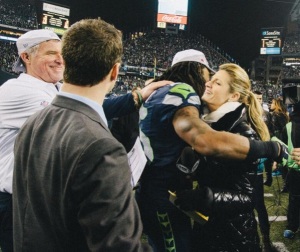 We would be remiss to overlook the fact that, instead of fearing for her life at the sight of an angry Black man, Andrews was in fact enamored by the experience. In an interview with For the Win, Andrews said that she thought Sherman’s response to her question was “so awesome. And I loved it” (a confession that verges on fetishization). This is not a media spin of Andrews’ earlier statement that
We would be remiss to overlook the fact that, instead of fearing for her life at the sight of an angry Black man, Andrews was in fact enamored by the experience. In an interview with For the Win, Andrews said that she thought Sherman’s response to her question was “so awesome. And I loved it” (a confession that verges on fetishization). This is not a media spin of Andrews’ earlier statement that
“I don’t want this to look like I was upset with him, I was frightened, I felt threatened, we all like Richard Sherman a lot at Fox,” Andrews told For The Win. “At that moment I saw how crazy it was going to blow up, and I wanted to make sure people knew it wasn’t a situation where I’m a victim and he acted like an idiot.”
Video coverage of the postgame interview suggests that Andrews did not flinch or retreat in response to Sherman’s ‘outburst’. Surely, she was caught off-guard by the enthusiastic quality of Sherman’s affect (she also appears to be deflecting projectile saliva or sweat), but Andrews’ body language does not signal fear; in her own words, she was no ‘victim’. Take a look for yourself:
Curiously, what’s somewhat haunting about this exchange is just how casually Andrews responds to Sherman. Though the cadence of her voice changes slightly when she asks, almost coy, “Who was talking about you?”, the move feels performative, as if for effect — to gain favor with American audiences who (again, following Berlant’s observation) find great pleasure in watching white women rehearse familiar tropes. (She’s ambitious, I’ll give her that.)
![]() The fact that Andrews’ own experience or interpretation of the event is not foregrounded in the outrage over whether or not Sherman intimidated or ‘scared’ her with his affective excess — it is important to note that Sherman actually fixes his gaze on the camera, or on a (white) gazing public, and is not addressing Andrews directly — is not inconsequential. The exclusion reveals a truth; namely, that a hetero-patriarchal white supremacist society is willing to appropriate the concerns of (white) women to make a racist point about the Black savage, but that this same society is not interested in addressing or ameliorating feminist concerns. (Yet another reason why white feminism’s recourse to a politics of inclusion has failed to revolutionize sex and gender relations.)
The fact that Andrews’ own experience or interpretation of the event is not foregrounded in the outrage over whether or not Sherman intimidated or ‘scared’ her with his affective excess — it is important to note that Sherman actually fixes his gaze on the camera, or on a (white) gazing public, and is not addressing Andrews directly — is not inconsequential. The exclusion reveals a truth; namely, that a hetero-patriarchal white supremacist society is willing to appropriate the concerns of (white) women to make a racist point about the Black savage, but that this same society is not interested in addressing or ameliorating feminist concerns. (Yet another reason why white feminism’s recourse to a politics of inclusion has failed to revolutionize sex and gender relations.)
Black athletes function (still) as profit-producing chattel who are bought and sold and traded by white team owners and other titans of industry — Sherman’s team, the Seattle Seahawks, is owned by Microsoft co-founder Paul Allen, who is worth an estimated $13 billion — in the form of merchandise and sponsorships and a whole host of other branding efforts, in a process not entirely unlike the corporeal branding chattel slaves once experienced on the slave plantation (not least of all because these experiences evoke similar psychosomatic responses). And when white women like Erin Andrews ‘build’ a career by leveraging their white femininity against the perceived threat of a mythical Black ‘boogeyman’, we learn why — as Audre Lorde famously warned — “the master’s tools” have not “dismantle[d] the master’s house.” Indeed, it becomes clear that the ‘afterlife’ of Black chattel slavery and its libidinal economy — to borrow from Saidiya Hartman’s allegorical formulation — is that it ‘lives’ on by evolving its discursive and material technologies. It adapts. It mutates. And with each mutation, it grows stronger and more resistant to treatment; the ideological apparatus of anti-Black racism as speciesism becomes more resilient, less clear as speciesism (or, in a self-proclaimed post-racial society, as plain ole’ racism) in the mind’s eye.
So when Howard notes that
A public personality can be black, talented, or arrogant, but he can’t be any more than two of these traits at a time. …It’s why we recoil at Kanye West’s rants, like when West, one of the greatest musical minds of our generation, had the audacity to publicly declare himself a genius (was this up for debate? [Yes.]), and partly why, over the six years of Barack Obama’s presidency, a noisy, obstreperous wing of the GOP has seemed perpetually on the cusp of calling him ‘uppity.’ …All this is based on the common, very American belief that black males must know their place, and more tellingly, that their place is somewhere different than that of whites. It’s been etched into our cultural fabric that to act as anything but a loud, yet harmless buffoon or an immensely powerful, yet humble servant is overstepping.
…Too many of us think that one ecstatic, triumphant black man showing honest, human emotion just seconds after making a play that very well could be written into the first appositive of his obituary, is not only offensive, but is also representative of the tens of millions of blacks in this country.
he is — perhaps unwittingly — prompting us to critically consider how and why Sherman ‘oversteps’ as a Black athlete: why Sherman is portrayed in the media and on Twitter as ‘uppity’, and what boundaries Sherman is (intentionally) traversing by not ‘knowing his place’. I would like to submit here (for discussion) the possibility that Sherman’s ‘crime’ is that — as a Black man who can speak and think and read as well (if not better than) any white man, or as a Black man who, to use the Fanonian metaphor, convincingly wears a white mask — he betrays the insurmountable human/animal divide that also functions as an ontological divide and a libidinal economy. (To be clear, the libidinal economy of slavery is an effect of the ontological crisis of Blackness, because reproduction, in a slave economy, produces progeny-as-property.)
Sherman mimes too well the white human subjectivity of an athlete who is also a scholar: an educated bloke who, yes, is better than you, by all measures of accomplishment. As Howard suggests, it is Sherman’s expression of “honest, human emotion” that a white gazing public is unable to digest or make intelligible; and like a child throwing a tantrum because he doesn’t have the language with which to understand or communicate what he wants — a Black man who ‘knows his place’ in the racial hierarchy of human beings — white Americans have responded to Sherman’s complex Blackness in the only way they know how: by reducing him to the animal he never was.
This analysis is written by M. Shadee Malaklou.
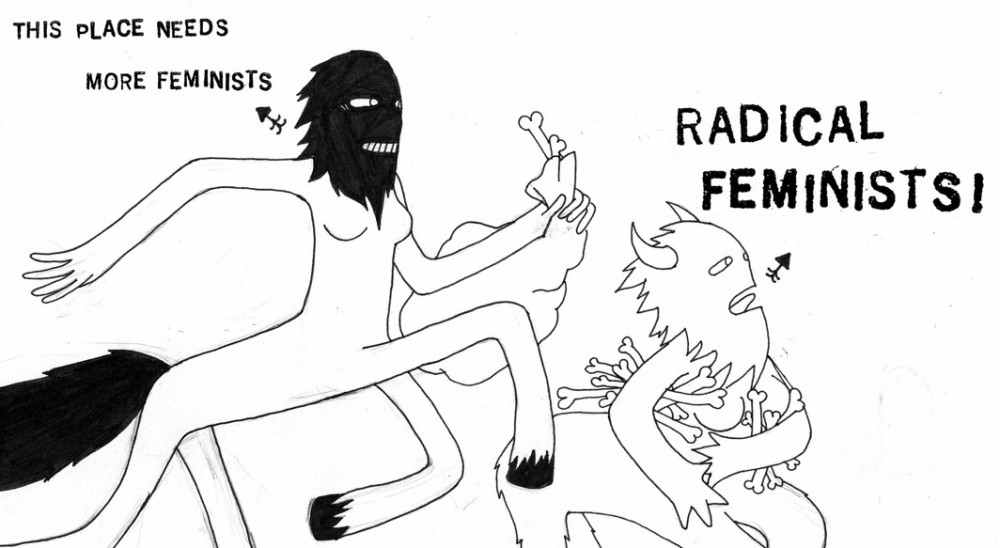
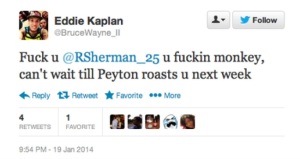
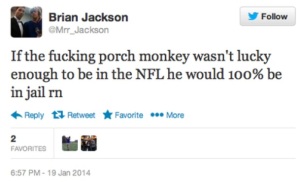

deeply insightful, thank you for sharing
Very nicely put Shadee. One of the best analysis of this incident I have read.
Yawn. zzzz. The author is way off black athletes are NOT chattel slaves. They are paid millions for their services. You know there was a time when pro football was separated into 2 leagues the NFL & the AFL and it was 80% to 90% white males who worked for low pay in an extremely violent sport. Black males protested& fought to be included into the professional sport. You take the good w/ the bad at the end of the day not every one will like what you say or do when you are a public person. If racists call names & rant its all they can do. They have no power to remove blacks from the league. These same black athletes are marrying white women like there no tomorrow so, obviously they don’t have problems with racism. Let’s focus on something more relevant like the inequity of the U.S justice system. There are more important matters to focus on than the problems of rich, black males. Their problems are clearly not mine.
Excellent and really smart, Shadee! Just two comments, which you may well know, but perhaps for readers who don’t follow sports, sports reporting, etc.: 1. Skip Bayless is the buffoon of sports commentators and Sherman’s snarky interview with him was regarded by most as a long-overdue comeuppance for Bayless. Not to say that Sherman isn’t very smart in this exchange; just that it was regarded differently by most viewers due to Bayless’s idiot status than, say, if Sherman were to challenge a more ‘respectable’ white male commentator. 2. I think your reading of the gendered, racialized, and sexualized dimensions of Andrews’s post-game interview with Sherman is spot-on; but I would caution against projecting that onto Andrews herself. She’s a very professional, savvy, smart sports reporter who, I think, is very careful and aware, in her comments on the interview, of precisely the kinds of racist, sexist readings that could be inferred from it (i.e., ‘wild’ black man, pretty white woman, etc.). Andrews herself has had to overcome pointedly racialized, gendered stereotypes in her highly masculinist, racially hierarchized profession, and, in the wake of the infamous peep-hole stalking incident involving her, she helped to pass new anti-stalking legislation and raise awareness of the gendered double standard in her profession. She’s also parlayed her visibility to raise money and awareness of hunger and poverty in the US, especially the southern US. My two cents!
This is a really amazing article. So insightful! Thank you.
Related article: http://www-psych.stanford.edu/~mcslab/PublicationPDFs/Not%20yet%20human.pdf
Pingback: Teaching About Racism | USH Teacher
Pingback: Moving on the Wires: This Week’s News and Posts | Aker: Futuristically Ancient
Pingback: Dave Zirin : Richard Sherman’s refusal to be a brand | The Rag Blog
Pingback: Understanding anti-Black racism as species-ism: Reflections on Richard Sherman’s affective excess and the Twitterverse’s response | Racialicious - the intersection of race and pop culture
Gender issues are smoke and mirrors to an extent. How come women haven’t been able to nation build when having access to massive wealth and power. Most rich men leave their fortunes to their wives who control great wealth. Why is it that oppressed men have been able to contribute more than most women? All the gender discrimination was settled with the 2nd wave of women’s rights back in the 1960’s which gave women the right to credit & to buy properties that was the last bastion of real discrimination against women. Everything else is just the lesbian movement which women don’t need to become men. Being a woman is more than good enough. Some folks need to get out of their towers and start living in real time. That’s all I’ve got to say. I’m not invested in any of this sociological crap. Signing off.
You said the sport’s industry “takes from Black bodies their bits and pieces of flesh, leaving Black athletes often permanently disabled and with little material or financial support in (a very early) ‘retirement’.” “Little financial support” certainly doesn’t describe NFL athletes. Even if they only play on the practice squad for one year, they’re making a life-changing amount of money, and get post-career benefits. Also, I’m curious as to what you make of the NHL, where everyone is white. ?
The rest of the article is a liiiiiitttle over the top. To put it concisely: there are a bunch of disgusting racist morons / trolls out there who said some disgusting things about Sherman (and continue to say disgusting things about black people on a regular basis). The whole media frenzy over Sherman though I don’t think was racial–though it could have been to an extent.
I really thought I was gonna kind of cringe during the Skip Bayless interview, but I actually thought it was great. Bayless is an asshat. Sherman is an amazing athlete. Bayless talks shit for a living (and Sherman is right, without much reasoning or facts to back up his shit talk). Sherman gets hyped before and after going to WAR. There’s no comparison, and Sherman did a good job putting Bayless in his place.
Anyway, yeah, those people on twitter are horrible douchebag racist ****s.